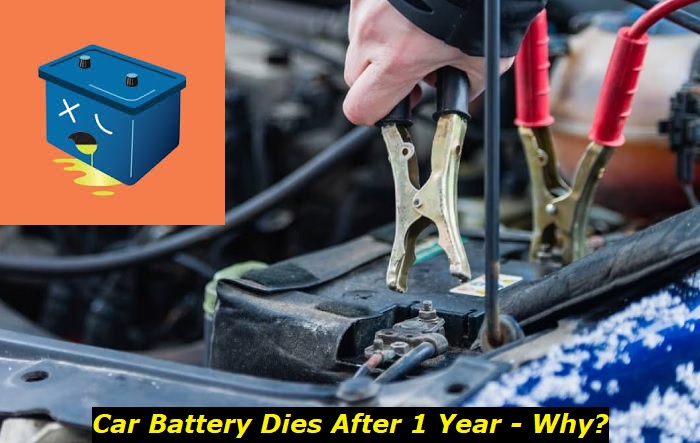Does your car battery stop working after you parked it and went on a short vacation for a couple of days? It's shocking and you wonder what went wrong, especially when the battery is less than a year old.
Dead car battery highlights
- Average lifespan:4 - 5 years
- Voltage range:less than 10 volts
- Symptoms:no crank, no lights
- Reasons:complete discharge, age, hard use
- Prevention:regular charging
- DIY fix:possible
- How much to fix?$0 - $250

How do car batteries work?
Car batteries can best be understood when you look at them holistically, considering their functions, components, construction, and various types available in the market. For the smooth running of a vehicle, the car battery must be in a tip-top shape. A car battery is to a car what the heart is to a man. It is the life wire of an automobile because it powers a car's engine when the ignition is activated.
The major function of a car battery is to supply the electrical energy needed to start the car engine. It delivers a power surge to the starter motor, which activates the combustion process. This initial spark of energy sets the engine in motion giving room for fuel and air to combine, generating the controlled explosions that power the vehicle.
A regular car battery comprises different essential parts that work together to create and store electrical energy. It is made up of a case, i.e., the durable plastic holds the internal components of the battery. There are a series of lead plates (cells) inside the battery, which are immersed in a sulfuric acid solution. Electricity is generated when chemical reactions take place on the plates (cells).
The cells are made up of plates, i.e., positive and negative, which are demarcated by insulating material to keep them from short-circuiting. For the cells to be active, they are made of special metal. While the positive plate is made of lead dioxide, the negative is pure lead.
The sulfuric acid solution and water in the battery is the electrolyte, and it allows for smooth movement of ions between plates which makes for the flow of electricity. Electricity is generated when both cells react with the acid solution via a chemical process called electrochemical discharge.
What is the average battery lifespan and charge?
First, you should have the understanding that no battery lasts forever, just like any other thing in the world. Hence, the lifespan of batteries varies, but typically, they range on an average of between three and five years. However, if you are still pushing the battery after five years, it is better to prepare for the worst because it might fail without notice.
Batteries are somewhat mysterious because while some of them give clues of intending failures, others don't. If your battery inches close to four years, it is time to have it tested. This testing will involve the battery itself and the charging system.
The battery test will ascertain if the battery is working properly while the charging system test is to ensure the system is supplying the battery with the required charge while it's running.
What are the factors affecting the lifespan of a battery?
The factors affecting the lifespan of a car battery are numerous and if well understood, you can maximize the battery's durability and performance. From the multiple factors, we can consider some common ones, which include usage patterns, driving conditions, high temperatures, maintenance, and battery age.
- Usage Style:How a battery is used determines its longevity. For instance, a car subjected to frequent short trips and stop-and-go traffic will have its battery stained in no time.
- Extreme High/Low Temperature:Temperatures at the two extreme ends of the thermometer speed up the chemical reactions or hinder the performance of your battery.
- Maintenance:A well-maintained battery lasts longer than a poorly maintained battery. Car owners must conduct routine inspections and cleaning to keep their battery maintenance game on top. Such practice will help identify destructive buildup on the nodes of the battery.
- Battery life:The older a battery, the lower its capacity; hence age plays a vital role in every battery's longevity and performance.
What causes the failure of the car battery within one year?
As a car owner, recall how frustrating it is when your car battery fails within a year. However, a clear understanding of the causes of this failure will help in diagnosing the issue, which allows you to take precautions. Hereunder are the causes of premature failure of batteries.
1) Factory Defects or Faulty Components
At times car batteries may come off the factory with defects or faulty components. Such defects can affect the performance and durability of the battery, hence causing the battery to die within a short time. Some batteries come with faulty connectors, low-quality materials, or improper assemblage, which to a large extent, can make the battery malfunction.
To guide against this, car owners are advised to get their batteries from reputable brands that have passed quality tests.
2) Sulfation
The process called sulfation happens frequently in lead-acid batteries, and do note that lead-acid batteries are generally used in cars. When a car battery is in use, it discharges; sulfate crystals form on the battery plates when not promptly recharged.
These deposits on the plate create insulation that will reduce the ability of the plates to hold a charge. However, as time goes on, the sulfation process reduces the battery's performance, thereby leading the battery to fail before time.
Sulfation processes increase due to frequent deep discharges, improper charging, or prolonged storage without maintenance.
3) Electrical System Issues
The impact of the electrical system of a car on the battery cannot be overemphasized. This system affects the durability and performance of the battery, and based on its use, different electrical system issues arise. These issues placed an excessive strain on the battery, which eventually caused premature failure of the battery. Some of the problems include:
- Parasitic Drain:This refers to the power consumed by electrical components of a vehicle when it's turned off. Malfunctioning components or wiring issues usually cause this drain, which can affect the battery's charge and reduce its lifespan.
- Faulty Charging System:When the alternator or voltage regulator of a vehicle goes bad, it leads to inadequate battery charging. Hence, when the charging is insufficient, this causes repeated deep discharges, which weakens the battery and depletes its lifespan.
- Faulty Wiring:Short-circuiting in the electrical system can also cause irregular power surges or improper current flow. Such inconsistencies can damage the battery and other electrical components, leading to premature failure.
4) External impact
Vehicles are exposed to harsh environmental conditions, which significantly impact the health condition of your battery and, in the long run, its lifespan. When the temperature goes extremely up or down, it speeds up the chemical reactions in the battery, thereby causing problems.
When the temperature goes up, it causes the battery fluid to evaporate, which speeds up plate corrosion, raising internal resistance. Contrariwise, when the temperature dips extremely, the battery's ability to deliver power diminishes, thereby creating friction in starting the engine.
What are the tips and hacks that can help prolong the lifespan of your battery?
Though batteries do not last forever, below are some tips and hacks to practice to prolong the lifespan of your battery.
1) Limit short rides
Short rides are deceptive because it makes you feel your battery is getting the charge it needs, whereas the reverse is the case. For instance, if you drive your car around the block to visit a neighbor, you are doing your battery harm. You shouldn't drive such a short distance because it keeps the battery from getting a full charge after discharging.
2) Fasten your battery tightly to its compartment
Do a routine check of your battery when you go for an oil change to ensure it is not moving around from its compartment. It's supposed to be fastened in a fixed position to keep the terminal connected always. This movement causes unwanted friction that leads to the battery wearing out.
In case there's corrosion on the metal holding it to position, it should be replaced immediately.
3) Turn the lights off after parking
Ensure the lights in your vehicle are turned off when parked to keep it from discharging. If your car does not automatically turn off its lights, then you need to do it consciously. This is one of the most important practices for every car owner, if faulted, could lead to a sudden battery wreck.
4) Check the battery terminals for corrosion
Corrosion is one of the saboteurs of battery terminals, it always aims to deplete battery's lifespan and cause them to go bad. Battery terminals corrode over time as you use the car; for this reason, care must be taken to keep the terminals clean. Every once in a while, scrub the terminal with a brush dipped in a baking soda and water solution, then rinse off with clean water. After, dry them off with a clean cloth.
5) Reduce electronics usage while idling
When driving, it's a habit to turn on different features like the radio and the air conditioner, it is important to know, however, that electronics draw a significant amount of power from the battery. Hence, when idling, it is essential to turn off all electronics to prolong the lifespan of your battery. Additionally, idling also wears the battery; hence do cut your idling time.
Conclusion
While car batteries are built to last for years, some factors can jeopardize this, therefore making them fail within a year. Some factors have been addressed above, with solutions added to keep things at bay. Engaging in simple tips provided in this post will go a long way to keep your battery firing for long.
About the authors
The CarAraC research team is composed of seasoned auto mechanics and automotive industry professionals, including individuals with advanced degrees and certifications in their field. Our team members boast prestigious credentials, reflecting their extensive knowledge and skills. These qualifications include: IMI: Institute of the Motor Industry, ASE-Certified Master Automobile Technicians; Coventry University, Graduate of MA in Automotive Journalism; Politecnico di Torino, Italy, MS Automotive Engineering; Ss. Cyril and Methodius University in Skopje, Mechanical University in Skopje; TOC Automotive College; DHA Suffa University, Department of Mechanical Engineering






Add comment